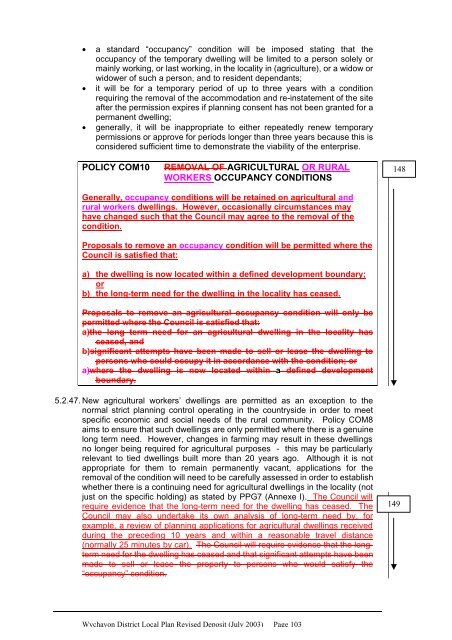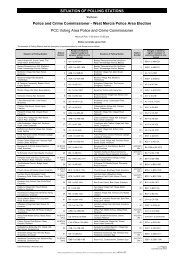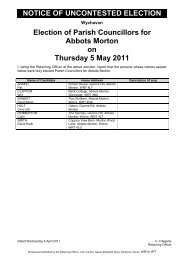Revised Deposit Plan - Wychavon District Council
Revised Deposit Plan - Wychavon District Council
Revised Deposit Plan - Wychavon District Council
You also want an ePaper? Increase the reach of your titles
YUMPU automatically turns print PDFs into web optimized ePapers that Google loves.
• a standard “occupancy” condition will be imposed stating that the<br />
occupancy of the temporary dwelling will be limited to a person solely or<br />
mainly working, or last working, in the locality in (agriculture), or a widow or<br />
widower of such a person, and to resident dependants;<br />
• it will be for a temporary period of up to three years with a condition<br />
requiring the removal of the accommodation and re-instatement of the site<br />
after the permission expires if planning consent has not been granted for a<br />
permanent dwelling;<br />
• generally, it will be inappropriate to either repeatedly renew temporary<br />
permissions or approve for periods longer than three years because this is<br />
considered sufficient time to demonstrate the viability of the enterprise.<br />
POLICY COM10 REMOVAL OF AGRICULTURAL OR RURAL<br />
WORKERS OCCUPANCY CONDITIONS<br />
Generally, occupancy conditions will be retained on agricultural and<br />
rural workers dwellings. However, occasionally circumstances may<br />
have changed such that the <strong>Council</strong> may agree to the removal of the<br />
condition.<br />
Proposals to remove an occupancy condition will be permitted where the<br />
<strong>Council</strong> is satisfied that:<br />
a) the dwelling is now located within a defined development boundary;<br />
or<br />
b) the long-term need for the dwelling in the locality has ceased.<br />
Proposals to remove an agricultural occupancy condition will only be<br />
permitted where the <strong>Council</strong> is satisfied that:<br />
a)the long term need for an agricultural dwelling in the locality has<br />
ceased, and<br />
b)significant attempts have been made to sell or lease the dwelling to<br />
persons who could occupy it in accordance with the condition; or<br />
a)where the dwelling is now located within a defined development<br />
boundary.<br />
5.2.47. New agricultural workers’ dwellings are permitted as an exception to the<br />
normal strict planning control operating in the countryside in order to meet<br />
specific economic and social needs of the rural community. Policy COM8<br />
aims to ensure that such dwellings are only permitted where there is a genuine<br />
long term need. However, changes in farming may result in these dwellings<br />
no longer being required for agricultural purposes - this may be particularly<br />
relevant to tied dwellings built more than 20 years ago. Although it is not<br />
appropriate for them to remain permanently vacant, applications for the<br />
removal of the condition will need to be carefully assessed in order to establish<br />
whether there is a continuing need for agricultural dwellings in the locality (not<br />
just on the specific holding) as stated by PPG7 (Annexe I). The <strong>Council</strong> will<br />
require evidence that the long-term need for the dwelling has ceased. The<br />
<strong>Council</strong> may also undertake its own analysis of long-term need by, for<br />
example, a review of planning applications for agricultural dwellings received<br />
during the preceding 10 years and within a reasonable travel distance<br />
(normally 25 minutes by car). The <strong>Council</strong> will require evidence that the longterm<br />
need for the dwelling has ceased and that significant attempts have been<br />
made to sell or lease the property to persons who would satisfy the<br />
“occupancy” condition.<br />
<strong>Wychavon</strong> <strong>District</strong> Local <strong>Plan</strong> <strong>Revised</strong> <strong>Deposit</strong> (July 2003) Page 103<br />
148<br />
149








